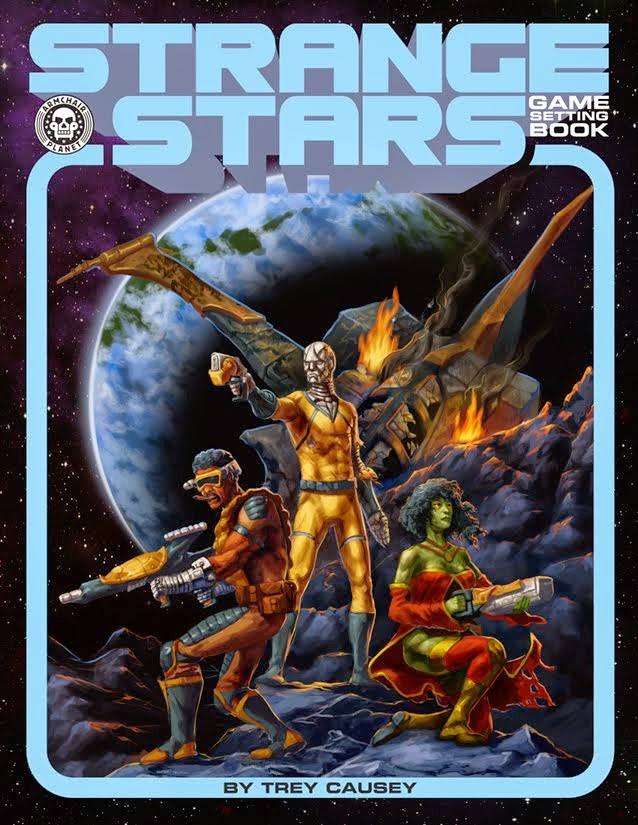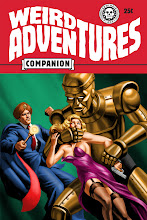Over email, I had on a conversation with Jason Sholtis on OU. Here are the best parts:
What's the secret origin of Operation Unfathomable?
In brief, I got swept up in the early throes of the Old School revival, decided to see if I could write game materials and submitted a piece to Matt Finch's zine Knockspell ("The Font of Glee" from issue 3). I was shocked and amazed that it was accepted, which only emboldened me, despite not having written much of anything outside of comic book scripts for years and years. I set out to write a follow up for Knockspell and came upon what I thought was a decent hook, sending novice adventurers into a "high level" dungeon partially depopulated by a previous expedition. My aim was to pack it full of what I considered to be new and unusual characters, encounters, and situations, and to express in a concise way my own approach to the Old School RPG experience. I wanted to demonstrate these personal idiosyncrasies via the traditional dungeon form, in much the same way as the anti-corporate punk rock scene (with its zines and other home made media) that I enjoyed participating in as a younger person.
When the Google Plus thing began to percolate, I wanted to see if I could manage to run a game using Hangouts and ran the Knockspell version of OU. We had fun, despite appalling PC casualties, and decided to continue on. Driven by the need for additional adventuring material, I began to expand the scope of OU, adding tons of new weirdos, locations, and horrors.
Did the campaigns/settings you run before bear any resemblance to the OU world, or was this sort of new territory?
I ran a campaign in the early-to-mid-nineties that had some similarities, primarily the Underdark-like subterranean wilderness. Once the PCs entered this wilderness, there they remained until the campaign fizzled. Important Old School cred note: I missed all of 2E D&D, and had no inkling of the Underdark as a thing.
So I know you saw Patrick Stuart's review of OU, where he took issue with its tone. "Cheese," I think is the word he used. What are your thoughts on tone in OU and D&D in general?
I guess I should start by saying that I think there are no limitations on tone in D&D; it's all about group preference. The game can accommodate the full range of tonal elements from the utmost Tolkienian seriousness, high drama with actual emotions resonating around the table, to low comedy and can sometimes vacillate wildly in the same campaign.
Whether any of those kinds of modes are desirable is entirely up to the players. Let the record show I make no value judgements in this department.
There is a popular notion that gaming materials should be as serious (and, possibly, scary) as a counterbalance to the comical behavior of players at the table. While I concede that this idea has some merit, I am wired in the way that I am wired.
Personally I find it nearly impossible to run a game of Dungeons & Dragons that doesn't skew into the ridiculous and I have embraced this approach. If I can present a game that has absurd elements that still engages players, I call it a victory.
For anybody who's taken a look at my Dungeon Dozen blog (Volume One still available!), this should come as no surprise.
I do find the whole milieu of D&D gaming to be ludicrous in a very fun way:
"I swing!"
"I just go ahead and pull the lever!"
"I check the giant skull for traps!"
"Why yes, I speak High Beetle-ese!"My attempt at writing an adventure module with a humorous (yet lethal!) tone was both natural and with purpose. For me, where a lot of adventures I have read in the past fall down is when they boil down to dull details and lists of stats. I figured if I can present things in a way that was amusing and engaging enough to be read through without pain, the reader would have a solid basis for running the thing. Zzarchov Kowalski wrote a piece for his blog that is fairly in line with what I hoped to accomplish. I didn't care so much if OU was innovative in its presentation, just that it was entertaining and memorable. The degree to which I have succeeded or failed in this is (of course) for others to judge
As regards "cheese," you know, cheese is pretty delicious but I guess it's used as a pejorative in this sense. Cheese, kitsch, camp: all of these could sort of apply to Unfathomable but they're all kind of vague terms that could be used to describe a lot of D&D play at the table. I will certainly own up to some of my influences being composed at least partially of cheese. Is cheese in the eye of the beholder? Is cheese played with a straight face more or less objectionable than cheese presented with a wink and a nod?
I do mention Star Trek the Original Series a couple times in the manuscript (I think there are two such references amounting to a small handful of words) which manages to be both cheesy and awesome simultaneously, which was my ambition with OU.
Unfathomable is a fairly accurate representation of my play style, which I'm advocating by publishing the thing, but I certainly don't reject other tones or styles out of hand and have enjoyed playing in a variety of games that run the tonal gamut.
Are there things you like or look for in setting related materials that you buy? Are there things you enjoy when other authors put them in a setting that you would probably never do in a setting you create?
I should answer first by saying that I am not much of a consumer of setting materials in general, as I have always been a bit obsessive about making original settings for the games I run, but I do enjoy checking out other people's work in this area. I avoid using materials that I haven't concocted myself because I'm an egomaniac, ahem, I mean because making that stuff is an aspect of the hobby I value and enjoy.
I've admired settings like Tekumel and Glorantha for years (and have been fortunate enough through the miracle of Google Plus to finally play in games of each captained by James Maliszewski and Barry Blatt respectively), but I would never set out to write something like those huge Glorantha tomes (which look awesome). For me I would rather drop hints and small bits of setting information though the presentation of an adventure or a series of adventures and leave tons of wiggle room for GMs to interpret the setting for themselves. For D&Dish settings, monster listings, character classes, spells, and especially art convey a sense of setting without becoming encyclopedia entries. To get in my union-mandated Hydra plugs, your Strange Stars is a great example of a setting presented without lengthy screeds that also allows the artwork to convey a great deal of information. Chris Kutalik's Slumbering Ursine Dunes series presents all kinds of setting information baked into the adventure material.
And with our Hydra Cooperative sponsors plugged, that's a wrap. Thanks Jason!







No comments:
Post a Comment